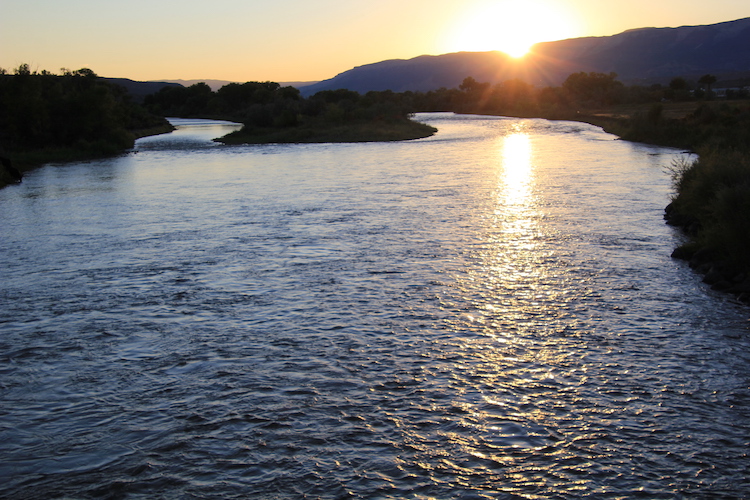
The sun setting on the Colorado River at Silt. Photo by Allen Best.
Bennet Commits to Protecting Water Conservation Funds
In his remarks at the Colorado Water Congress Summer Conference, Colorado U.S. Senator Michael Bennet once again reiterated the importance of protecting the federal investments in Western water infrastructure, calling it “a job that does not end.”
Bennet helped secure the funding within the Bipartisan Infrastructure Law and the Inflation Reduction Act. He was joined at the conference by other members of the Colorado Congressional delegation, reminding attendees that it will take continued vigilance to ensure that the pledged funds reach the intended destination.
At the conference, Bennet addressed his priorities for the return of Congress after the August break. At the top of the agenda will be writing the 2023 Farm Bill; which is normally approved and funded for a five-year period of time. This is expected to include protecting the $20 billion for agricultural conservation in the Inflation Reduction Act (IRA) and $10 billion for forestry in the IRA and Bipartisan Infrastructure Law.
“We’re going through a 1,200-year drought. We aren’t getting any more water,” said Bennet. “Producers are in the position to apply their ingenuity and imagination to create value on their farms and ranches that can be passed on to the next generation, and that needs to be reflected in the farm bill.”
Both Hickenlooper and Bennet have advanced the role that must be played by the 30 tribes of the Colorado River Basin; recommending a permanent seat at the table on water renegotiations. The tribes did get attention from the infrastructure bill with about $5 billion set aside for their projects, said Bennet. But in Colorado River Basin negotiations, they have had no voice.
Bennet serves as Chair of the Subcommittee on Conservation, Climate, Forestry, and Natural Resources. He has focused on addressing drought, improving our country’s conservation and forestry programs for the West, and ensuring our farmers and ranchers have the tools they need to adapt to a changing climate in the upcoming Farm Bill.
He’s already warned that other members of the U.S. Senate Committee On Agriculture, Nutrition & Forestry, of which he is a member, will try to usurp that money. “We have to make sure farmers and ranchers in the West have the chance to participate meaningfully” in addressing climate change, he said.
Bennet said he is hoping to expand some farm bill programs so that ranchers and farmers have a chance to support soil health and other drought-mitigating programs focused on watershed protection. These initiatives include well easement projects connected to groundwater, and the Conservation Reserve Enhancement Program administered by the Farm Service Agency.
He stressed the importance of oversight, not just in the administration of the billions of dollars in federal funding for drought and water infrastructure. This funding won’t arrive instantaneously — it will take a year or more to move through the system.
How much money? Bennet has estimated about $4 billion from the inflation bill for permanent and long-term reductions in the lower basin states, as well as $8 billion from the infrastructure legislation. The next step is to try to forge a consensus among the seven basin states of the Colorado River about how to reapportion the water, that the U.S. Bureau of Reclamation can ratify.
That could be easier said than done, given the friction between the Upper Basin states and the Lower Basin states. The Biden Administration has directed the Bureau of Reclamation to get the seven states to agree on a plan to handle the water crisis on the Colorado River. It’s not that they don’t agree on the science and the diminished flow of the Colorado. Regardless of being red or blue states they do — they are just not yet at the point of agreeing on what to do about it.
In Biden’s blunt language regarding the need for the seven states to work together; “We’re not fooling around.” By the end of 2023, the Bureau is expected to have some rulemaking in place that will cobble the agreement among the states to the year 2026. But that is the limit of the extension because the current operating guidelines for the Colorado River expire then and there is no choice: they have got to be renegotiated.
Bennet is on record saying, “I do not want the Bureau telling the American West what this will look like.”







Recent Comments